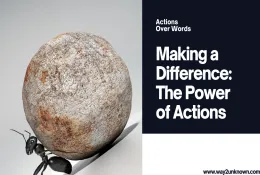Break the ice
 “Break the ice” means to start a conversation and make a situation less awkward. It’s like melting tension and making people feel more comfortable.
“Break the ice” means to start a conversation and make a situation less awkward. It’s like melting tension and making people feel more comfortable.
 “Break the ice” means to start a conversation and make a situation less awkward. It’s like melting tension and making people feel more comfortable.
“Break the ice” means to start a conversation and make a situation less awkward. It’s like melting tension and making people feel more comfortable.
 “Actions speak louder than words” means that what someone does is more important than what they say. It’s about how actions can show someone’s true intentions and character. It’s a reminder to pay attention to what people do rather than just what they say.
“Actions speak louder than words” means that what someone does is more important than what they say. It’s about how actions can show someone’s true intentions and character. It’s a reminder to pay attention to what people do rather than just what they say.
 “Kick the bucket” is a funny way to say someone died. It’s not clear where the phrase came from, but it’s used to talk about death in a light-hearted way. People might use it to make the topic less serious.
“Kick the bucket” is a funny way to say someone died. It’s not clear where the phrase came from, but it’s used to talk about death in a light-hearted way. People might use it to make the topic less serious.
 Overall, the idiom “as genuine as a three-dollar bill” is used to convey a sense of skepticism or disbelief about the authenticity or trustworthiness of something or someone. It’s a colorful way to express doubt or suspicion.
Overall, the idiom “as genuine as a three-dollar bill” is used to convey a sense of skepticism or disbelief about the authenticity or trustworthiness of something or someone. It’s a colorful way to express doubt or suspicion.
 So, to sum it up, the idiom “in the black” refers to a positive financial state where one is making a profit or has a positive balance. It’s a term used to describe financial stability and success.
So, to sum it up, the idiom “in the black” refers to a positive financial state where one is making a profit or has a positive balance. It’s a term used to describe financial stability and success.
 "Making ends meet" refers to the ability to cover essential expenses with available income or resources. It involves budgeting, prioritizing needs, and sometimes making sacrifices to ensure financial stability. This phrase captures the ongoing challenge many face in balancing income and expenses to meet basic needs without going into debt or experiencing financial strain.
"Making ends meet" refers to the ability to cover essential expenses with available income or resources. It involves budgeting, prioritizing needs, and sometimes making sacrifices to ensure financial stability. This phrase captures the ongoing challenge many face in balancing income and expenses to meet basic needs without going into debt or experiencing financial strain.
 In conclusion, the idiom “living hand to mouth” describes a challenging financial situation where one struggles to meet basic needs without any financial surplus. It highlights the lack of financial security and the constant struggle to make ends meet. Overcoming this situation often requires a combination of resources, support, and proactive steps towards long-term financial stability.
In conclusion, the idiom “living hand to mouth” describes a challenging financial situation where one struggles to meet basic needs without any financial surplus. It highlights the lack of financial security and the constant struggle to make ends meet. Overcoming this situation often requires a combination of resources, support, and proactive steps towards long-term financial stability.
 This idiom is often used to refer to contributing money, effort, or resources in a given situation. It’s about fulfilling your obligations or making your share of the contribution. So, when someone says, “It’s time to ante up,” they’re urging you to fulfill your obligations, make your contribution, or take action.
This idiom is often used to refer to contributing money, effort, or resources in a given situation. It’s about fulfilling your obligations or making your share of the contribution. So, when someone says, “It’s time to ante up,” they’re urging you to fulfill your obligations, make your contribution, or take action.
 This idiom is way of acknowledging the opponent’s impressive performance and the challenge posed. It shows that you were a formidable opponent who made them work hard to achieve their goals.
This idiom is way of acknowledging the opponent’s impressive performance and the challenge posed. It shows that you were a formidable opponent who made them work hard to achieve their goals.
 So, when someone says that someone was born with a silver spoon in their mouth, they’re highlighting the person’s privileged upbringing and the advantages they’ve had in life. It’s a way to acknowledge the wealth and privilege that has shaped their experiences and opportunities.
So, when someone says that someone was born with a silver spoon in their mouth, they’re highlighting the person’s privileged upbringing and the advantages they’ve had in life. It’s a way to acknowledge the wealth and privilege that has shaped their experiences and opportunities.
 The idiom “look like a million bucks” means that someone is looking exceptionally stylish, attractive, and confident. It’s a way of saying you’re absolutely rocking your look.
The idiom “look like a million bucks” means that someone is looking exceptionally stylish, attractive, and confident. It’s a way of saying you’re absolutely rocking your look.
 "Sticky fingers" refers to a person who habitually steals or acts dishonestly, particularly in matters involving money or valuables. Originating from the literal idea of fingers coated with a sticky substance making it easier to take things unnoticed, the term metaphorically implies a lack of trustworthiness and integrity. It warns others to be cautious of individuals prone to theft or unethical behavior, whether in personal relationships, business dealings, or organizational contexts.
"Sticky fingers" refers to a person who habitually steals or acts dishonestly, particularly in matters involving money or valuables. Originating from the literal idea of fingers coated with a sticky substance making it easier to take things unnoticed, the term metaphorically implies a lack of trustworthiness and integrity. It warns others to be cautious of individuals prone to theft or unethical behavior, whether in personal relationships, business dealings, or organizational contexts.
 "Tighten the belt" is an idiom suggesting the need to cut unnecessary expenses in response to financial constraints or to achieve savings goals. Originating from the literal act of adjusting one's clothing for a tighter fit during lean times, it symbolizes the conscious effort to live within one's means and manage finances more prudently. This phrase encourages individuals and organizations to reassess spending habits, prioritize essentials, and adopt more efficient practices to navigate economic challenges effectively.
"Tighten the belt" is an idiom suggesting the need to cut unnecessary expenses in response to financial constraints or to achieve savings goals. Originating from the literal act of adjusting one's clothing for a tighter fit during lean times, it symbolizes the conscious effort to live within one's means and manage finances more prudently. This phrase encourages individuals and organizations to reassess spending habits, prioritize essentials, and adopt more efficient practices to navigate economic challenges effectively.
 The phrase "costs an arm and a leg" is a vivid idiom used to emphasize that something is extremely expensive or financially burdensome. Its origins are uncertain, but it likely originated in mid-20th century America, drawing on the notion of the significant sacrifice implied by losing a limb. This expression serves as a colorful and memorable way to convey the idea of excessive cost or financial strain.
The phrase "costs an arm and a leg" is a vivid idiom used to emphasize that something is extremely expensive or financially burdensome. Its origins are uncertain, but it likely originated in mid-20th century America, drawing on the notion of the significant sacrifice implied by losing a limb. This expression serves as a colorful and memorable way to convey the idea of excessive cost or financial strain.
 The phrase "to go from rags to riches" denotes a journey of significant socioeconomic advancement, often from poverty to wealth or from humble beginnings to great success. It symbolizes overcoming adversity and achieving remarkable success through hard work, determination, and resilience. These stories inspire others with the potential for upward mobility and the pursuit of dreams, showcasing the transformative power of perseverance and opportunity.
The phrase "to go from rags to riches" denotes a journey of significant socioeconomic advancement, often from poverty to wealth or from humble beginnings to great success. It symbolizes overcoming adversity and achieving remarkable success through hard work, determination, and resilience. These stories inspire others with the potential for upward mobility and the pursuit of dreams, showcasing the transformative power of perseverance and opportunity.
 So, the idiom “throw money down the drain” is all about wasting money on something that doesn’t bring any value or benefit. It’s like watching your money disappear without getting anything in return.
So, the idiom “throw money down the drain” is all about wasting money on something that doesn’t bring any value or benefit. It’s like watching your money disappear without getting anything in return.
 Rolling in dough, means someone is doing really well financially. They might have a fancy house, drive a fancy car, or be able to afford luxurious vacations. They’re living the high life.
Rolling in dough, means someone is doing really well financially. They might have a fancy house, drive a fancy car, or be able to afford luxurious vacations. They’re living the high life.
 To sum it up, “a drop in the bucket” refers to a small or insignificant amount or action compared to the larger whole. It highlights the idea that the impact or effect of that small amount is minimal in the grand scheme of things.
To sum it up, “a drop in the bucket” refers to a small or insignificant amount or action compared to the larger whole. It highlights the idea that the impact or effect of that small amount is minimal in the grand scheme of things.
 Pinch pennies, means to be very frugal and careful with one’s spending. It’s about being mindful of expenses and finding ways to save money. It can be a smart financial strategy, but it’s important to strike a balance between saving and enjoying life.
Pinch pennies, means to be very frugal and careful with one’s spending. It’s about being mindful of expenses and finding ways to save money. It can be a smart financial strategy, but it’s important to strike a balance between saving and enjoying life.